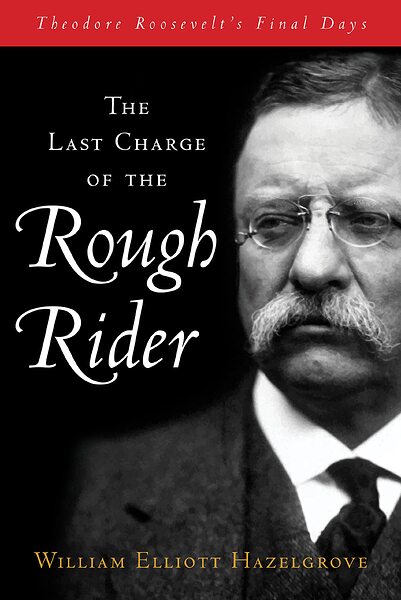Looking for a good read? Here is a recommendation. I have an unusual approach to reviewing books. I review books I feel merit a review. Each review is an opportunity to recommend a book. If I do not think a book is worth reading, I find another book to review. You do not have to agree with everything every author has written (I do not), but the fiction I review is entertaining (and often thought-provoking) and the non-fiction contain ideas worth reading.
Book Review
Roosevelt’s Last Stand
Reviewed by Mark Lardas
June 25, 2023
“The Last Charge of the Rough Rider: Theodore Roosevelt’s Final Days,” by William Hazelgrove, Lyons Press, 2023, 360 pages, $32.00 (Hardcover), $30.00 (Ebook), $20.99 (Audiobook)
In the last two years of his life Theodore Roosevelt attempted something no ex-President previously did. He wanted to command troops in battle as a division commander.
“The Last Charge of the Rough Rider: Theodore Roosevelt’s Final Days,” by William Hazelgrove tells that story. An account of the last two years of Roosevelt’s life, from April 1917 through January 1919, it recounts the political duel between Roosevelt and then-President Woodrow Wilson.
Alternating between 1917 through 1919 and flashbacks to earlier and significant periods in the lives of Roosevelt and Wilson, Hazelgrove takes readers through the US entry into World War I. He shows the political duel between Roosevelt and Wilson during that time. Roosevelt wanted the US to join the war; Wilson resisted.
When the US finally declared war on Germany, Roosevelt and his sons determined to participate. Roosevelt wanted to raise a volunteer division, much as he raised the First Volunteer Cavalry Regiment in the Spanish-American War. His sons served in France and Mesopotamia. One son was badly injured in ground combat. Another, Quentin, died in air combat.
Roosevelt’s attempts to lead a volunteer division were ultimately scotched by Wilson and US Army leadership. Wilson viewed Roosevelt as a potential rival for the 1920 election. Army leadership disliked Roosevelt due to jealousies dating to the Spanish-American War.
A fascinating aspect of the book is how modern medicine changed America. Wilson and Roosevelt both were both laid low prior to the 1920 Presidential election. Their incapacitating illnesses are easily treated today. Wilson’s hypertension, which could be controlled through drugs, led to a disabling stroke. Roosevelt died from infections antibiotics available only twenty years later could have easily cured.
Hazelgrove depreciates Roosevelt’s attempt to raise a volunteer formation. He viewed it as antiquated, an artifact of the 18th and 19th centuries. Yet the military history of the late 20th and early 21st centuries shows this to be premature. Volunteer formations proved successful in many wars since 1950, even against the United States. Whether Roosevelt’s volunteer division would have proved useful in Great War will never be answered, yet cannot be dismissed as glibly as Hazelgrove does.
“The Last Charge of the Rough Rider” remains a book worth reading. It is well and entertainingly written. It also offers valuable insights into the United States of 1900 through 1920, explaining why the rest of the century turned out the way it did.
Mark Lardas, an engineer, freelance writer, historian, and model-maker, lives in League City. His website is marklardas.com.
